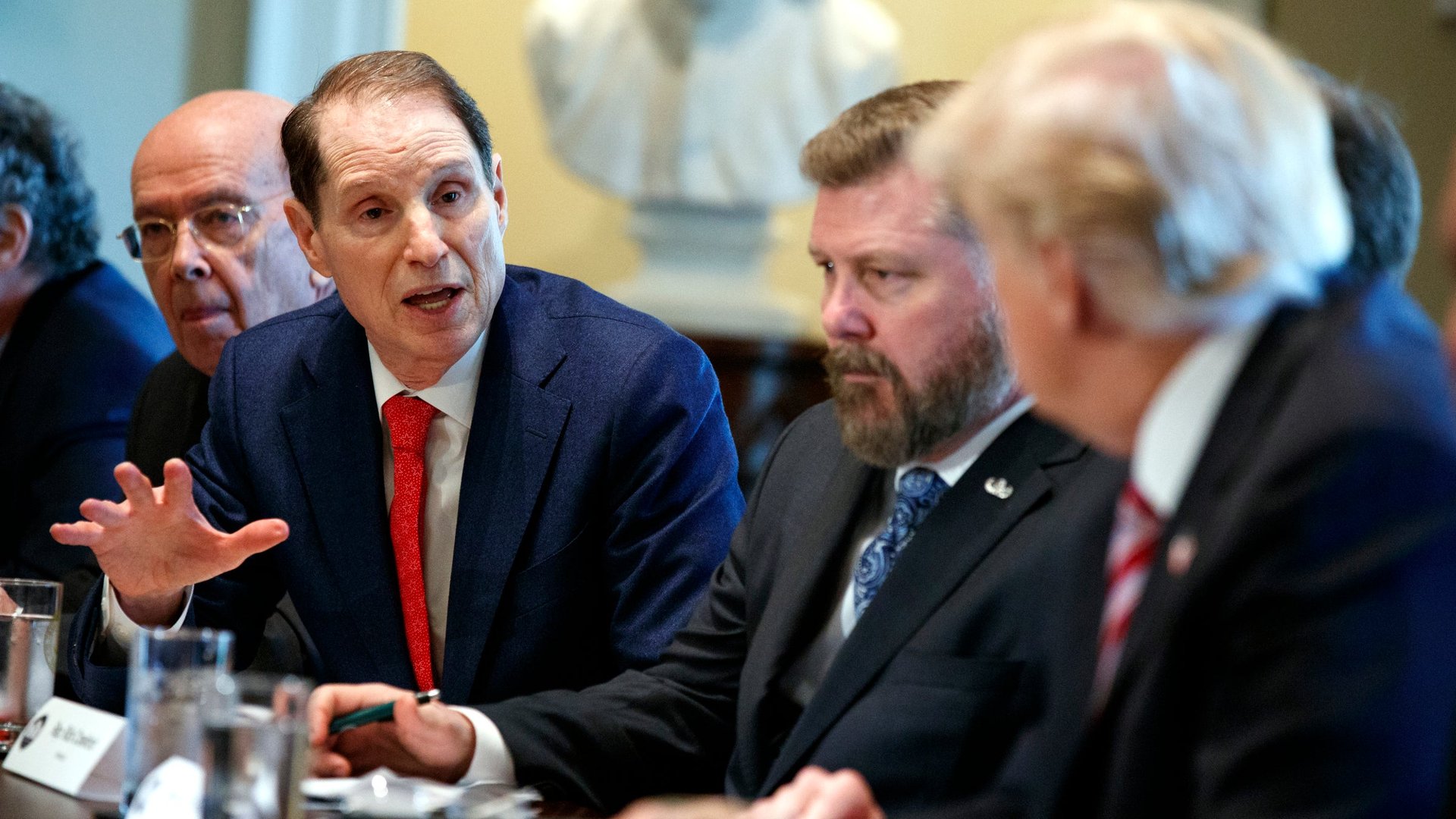Senator Ron Wyden: “The only thing that is consistent about the Trump trade policy is the chaos.”
Confused about US trade policy? Us, too. Quartz spoke to Oregon Senator Ron Wyden, the senior Democratic lawmaker on the committee that writes US trade law. An edited and condensed version of our conversation follows.


Confused about US trade policy? Us, too. Quartz spoke to Oregon Senator Ron Wyden, the senior Democratic lawmaker on the committee that writes US trade law. An edited and condensed version of our conversation follows.
Early in his term, you applauded some of Trump’s moves to impose tariffs on Canada. What is your take now? Are we in a trade war right now?
Senate democrats have come together around saying that enforcement of the trade laws is absolutely crucial. And I thought that Donald Trump had a valid point, in terms of saying that China was ripping off our technology, harming our ability to create high-skill, high-wage jobs. And then the president essentially went off that agenda to cut an undeserved break for serial sanction violator ZTE. And in effect, he didn’t address China ripping off our technology, thousands of jobs and our competitiveness, and now there is a national security problem.
In the middle of this whole ZTE debate, the company that the president just tried to help, his new own nominee to head the office of counter intelligence has said they are on espionage threat. The only thing that is consistent about the Trump trade policy is the chaos, and you practically get a daily dose of that.
It’s hard to understand the president’s position. You’ve asked before if loans from Chinese companies or trademarks granted to the president’s family are behind these decisions. How much do you think that the president’s motivation?
One day he is announcing investment restrictions on China, and then a few weeks later his top advisers are calling those restrictions fake news and denying they are ever in the works. A big part of this is just trying to keep up with the stories and, you know, I have said, in a lot of these instances, the Trump administration flips their position more times than a kid on a summer diving board. If you reward ZTE one day, and then trade tariff threats another, that hurts your chances of getting a strong deal with China, and by the way, also makes it difficult for us to keep our allies united with us on trade.
Speaking of our allies, do you think NAFTA is going to be renegotiated?
The sand is definitely running out of the hourglass this year. Right now, the NAFTA negotiations are on hold. The Mexican elections are next week. I don’t see the parties seriously engaging until those results are known. There was some valuable work done in the first nine months or so, and I think if the president and his negotiators wanted to take the time to have the discipline to have a united position on the issue, there would be an opportunity to get a good deal. They seem to spend an awful lot of time debating each other.
NAFTA needs a vigorous overhaul, there’s got to be tougher, much tougher, enforceable labor and environmental commitments, remove chapter 19 which makes it harder to fight unfair trade practices…and it has to address trade barriers that aren’t dairy, wine and key manufacturing industry. We ought to be more vigorous in enforcing the laws against trade cheats, and then upgrading these agreements, starting with NAFTA, on issues like ensuring robust digital trade, data moving freely across borders.
These issues never even came up during the original NAFTA, but digital trade is not just something important to cloud service providers or internet companies. It’s important to people who are involved in moving and storing data, that’s critical for businesses of all sizes and shapes.
Are your constituents starting to feel the effects of trade restrictions imposed thus far?
I’ll walk you through Oregon. Potato farmers, they export a third of what they grow, they’re worried about the prospects of tariffs at big markets like Mexico. The cherry growers in Oregon, they’ve got a million and a half boxes of cherries ready to ship to China. They don’t want to see the cherries stuck on the dock or rotting in a warehouse because of China’s retaliation. …The brewers have been feeling positive until recently, when they’ve been telling all the senators their costs are skyrocketing when they need new can liners and holding tanks—what are they made of? Steel and aluminum.
The person making pipe fittings in Portland needs to know what steel is going to cost. The person farming potatoes and harvesting has to know if they can get a good price for the crop when its ready to come out of the ground. And the president, somehow out of all this, seems to enjoy chaos more than anything else, and American workers then pay the price.